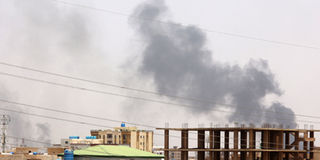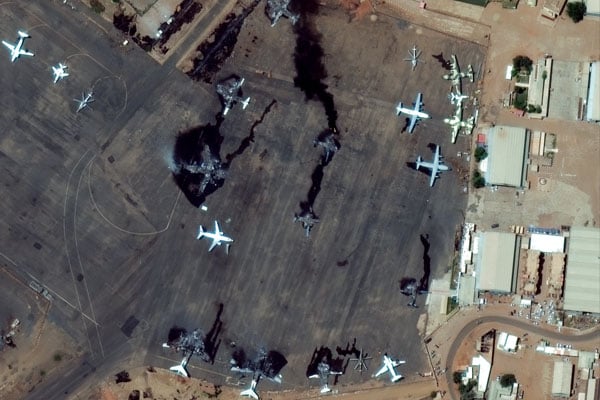Sudan capital hit by blasts as deadly conflict enters fourth day

Smoke billows behind residential buildings in eastern Khartoum on April 17, 2023, fighting in Sudan raged for a third day in battles between the army and paramilitary forces. Explosions rocked the Sudanese capital on April 17 as fighting, which erupted on the weekend after weeks of power struggles between the two generals who seized power in a 2021 coup, continued with the death toll surpassing 100. Photo | AFP
What you need to know:
- Battles have taken place throughout the vast east African country and there are fears of regional spillover of the conflict that has seen air strikes, artillery and heavy gunfire
Explosions rocked the Sudanese capital Khartoum on Tuesday as fighting that has claimed nearly 200 lives entered a fourth day, despite growing international calls for an end to hostilities.
A weeks-long power struggle erupted into deadly violence Saturday between the forces of two generals who seized power in a 2021 coup: army chief Abdel Fattah al-Burhan and his deputy, Mohamed Hamdan Daglo, who commands the paramilitary Rapid Support Forces (RSF).
Battles have taken place throughout the vast east African country and there are fears of regional spillover of the conflict that has seen air strikes, artillery and heavy gunfire.
In a statement, G7 foreign ministers meeting in Japan warned the fighting "threatens the security and safety of Sudanese civilians and undermines efforts to restore Sudan's democratic transition".
But despite their call for the warring parties to "end hostilities immediately", loud explosions were heard on Tuesday morning in Khartoum, where militiamen in turbans and fatigues roamed the streets.
Terrified residents of the capital are spending the last and holiest days of Ramadan watching from their windows as tanks roll through the streets, buildings shake and smoke from fires triggered by the fighting hangs in the air.
"Bombardments usually start around 4:00 am and they continue for a few hours, but today they haven't stopped," said Khartoum resident Dallia Mohamed Abdelmoniem.
"We haven't slept in the past four days," she said, adding her family had been staying indoors "trying to keep our sanity intact".
Army vows 'crushing defeat'
Civilians have also seen their food supplies run out, as the violence has prevented the few grocery stores that remain open to replenish dwindling stocks. The fighting has also damaged aircraft and brought a halt to flights to and from Khartoum airport.
US Secretary of State Antony Blinken said he had spoken with the two generals and "underscored the urgent need for a ceasefire".
Daglo said on Twitter after his call with Blinken that the RSF "reaffirms its approval" of a 24-hour "armistice to ensure the safe passage of civilians and the evacuation of the wounded".
The army bluntly dismissed his statement, however.
"We are not aware of any coordination with the mediators and the international community about a truce, and the rebellion's declaration of a 24-hour truce aims to cover up the crushing defeat it will receive within hours," it warned on Facebook.
Blinken said a US diplomatic convoy had been fired upon on Monday, though those inside were unharmed, in what he called a "reckless" act.
In a separate incident, the European Union said its ambassador to Sudan was attacked in his home in Khartoum on Monday. A spokesperson told AFP the veteran diplomat was "OK" following the assault.
Derailed transition
The fighting broke out on Saturday after bitter disagreements between Burhan and Daglo over the planned integration of the RSF into the regular army -- a key condition for a final deal aimed at ending a crisis since the 2021 coup, which derailed a transition to democracy.
Both claim to be in control of key sites, including the airport and the presidential palace -- none of which could be independently verified.
Analysts say the fighting in the capital is unprecedented and could be prolonged.
Volker Perthes, the head of the UN mission to Sudan, told the Security Council in a closed-door session Monday that at least 185 people had been killed and another 1,800 wounded.
"It's a very fluid situation so it's very difficult to say where the balance is shifting to," he said.
Medics in Sudan had earlier given a death toll of nearly 100 civilians and "dozens" of fighters from both sides, but the number of casualties was thought to be far higher, with many wounded unable to reach hospitals.
The official doctors' union warned fighting had "heavily damaged" multiple hospitals, with some completely "out of service".
The World Health Organization warned that several Khartoum hospitals "have run out of blood, transfusion equipment, intravenous fluids and other vital supplies".
Humanitarian organisations shuttered
In the western region of Darfur, international medical aid organisation Doctors Without Borders (MSF) reported receiving 183 wounded patients at the only hospital in El Fasher still operating in North Darfur state, 25 of whom it said had died.
"The majority of the wounded are civilians who were caught in the crossfire -- among them are many children," MSF's Cyrus Paye said.
Three UN World Food Programme staff were also among those killed on Saturday in Darfur, where humanitarian missions have had medical and other supplies looted, according to Save the Children and MSF.
A number of organisations have temporarily suspended operations in the country, where one-third of the population needs aid.
"This renewed fighting only aggravates what was already a fragile situation, forcing UN agencies and our humanitarian partners to temporarily shutter many of our more than 250 programmes across Sudan," said UN emergency relief coordinator Martin Griffiths.
Influential northern neighbour Egypt said it had discussed with Saudi Arabia, South Sudan and Djibouti -- all close allies of Sudan -- "the need to make every effort to preserve stability and safety".
President Abdel Fattah al-Sisi called on the two sides to "return to the negotiating table" and said he was working on the return of Egyptian military "trainers" captured Saturday at an air base by RSF forces.





